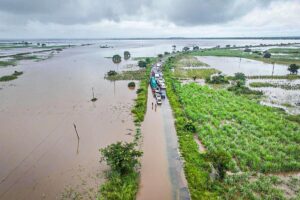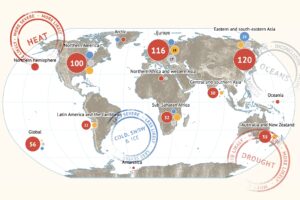We handpick and explain the most important stories at the intersection of climate, land, food and nature over the past fortnight.
This is an online version of Carbon Brief’s fortnightly Cropped email newsletter. Subscribe for free here.
Key developments
‘Tricks’ and ‘cover-ups’
LIVESTOCK EMISSIONS: Climate scientists speaking to the Financial Times accused the governments of New Zealand and Ireland of using an “accounting trick” to “cover up” methane emissions from their livestock sectors. An open letter from 26 climate scientists and covered by the newspaper said that New Zealand’s “proposed new methane targets risk setting a dangerous precedent”. The title added that scientists have separately raised concerns about Ireland’s approach.
POTENTIAL PROBLEMS: The controversy hinges on a way for measuring the impact of methane emissions on climate change, called “global warming potential star” (GWP*), the FT said. This method “estimates [methane’s] contribution to warming based on how emissions are changing relative to a baseline”. By contrast, the “long-established approach” used by most countries “compares the total warming impact of a given mass of methane to the same mass of [carbon dioxide] over a 100-year period”, the newspaper said.
‘MISAPPLICATION’: The scientists told the FT that some governments are “misapplying” GWP* to justify setting “no additional warming” targets, which allow methane emissions to remain flat rather than decline. The governments of Ireland and New Zealand did not respond to the newspaper’s requests for comment. But the newspaper added that “proponents” of the GWP* typically argue that it “better reflects methane’s short-lived nature in the atmosphere compared to the long-lasting effects of CO2”. One of the scientists behind the letter explained more of his thoughts in a LinkedIn post. A scientist not involved in the letter also posted a response.
SOMETHING FISHY: Elsewhere, an investigation by DeSmog and the Guardian has alleged that several UK supermarkets have sold seabass linked to “devastating overfishing” in Senegal. The two publications said that the retailers are accused of selling fish from Turkish farms that import large quantities of “fishmeal” – ground up fish used as feed – sourced from the African nation. Overfishing for fishmeal in Senegal is linked to “unemployment” and “food insecurity”, according to the Guardian. Responding to the claims, several of the supermarkets said they do not currently source from the implicated farms, but declined to say whether they had in the past.
Wild weather worldwide
EARLY MONSOON MAYHEM: An “unprecedented” early monsoon caught India’s farmers off guard, with “massive crop losses in states such as Tamil Nadu, Maharashtra, Telangana and Gujarat”, IndiaSpend reported. Climate scientists attributed the pre-monsoon thunderstorms to “unusual sea surface temperature patterns in the Pacific since 2023” and a higher frequency of “western disturbances” – extratropical storms originating over the Mediterranean. In the past week, north-eastern India has been battered by flash floods and landslides, with “at least 32 people killed and tens of thousands displaced”, the Independent reported. The newspaper noted that “studies show the monsoon in south Asia is getting worse due to the climate crisis”.
DELUGE AND DROUGHT: BBC News reported that more than 700 people are believed to be dead after “devastating” floods hit Nigeria, with the farming region of Mokwa witnessing “the worst [floods] in the area for 60 years”. Separately, Reuters reported that China’s south-western Yunnan province was hit by “flash floods and mudslides”, triggered by heavy rainfall. In unconnected reporting, Bloomberg said that China had stepped up cloud seeding to “bolster rainfall across parched wheat-growing areas” in the north, adding that the country had ramped up “weather modification” investments as “climate change heightens food security risks.”
CANADA BURNS: Canada’s prairie provinces continued to reel from “record-breaking” early-season wildfires, the Guardian reported. It pointed out that in Manitoba alone, wildfires have burned “about 200,000 hectares already this year” – three times “the recent full-year average”. Manitoba premier Wab Kinew said that simultaneous fires “in every region” were a “sign of a changing climate that we are going to have to adapt to”. The Guardian added that First Nations peoples in Saskatchewan – one of three recognised Indigenous peoples in Canada – “have been particularly affected, with some entire communities evacuated”.
Spotlight
UK’s former lead negotiator on UN nature talks
In this Spotlight, Carbon Brief speaks to the UK’s former lead UN negotiator about the successes and challenges of international nature talks.
Will Lockhart OBE represented the UK in UN nature negotiations from 2021 until the end of COP16 talks in Rome in February of this year.
In 2022, he helped to negotiate the Kunming-Montreal Global Biodiversity Framework (GBF), a landmark deal which has a headline “mission” to “halt and reverse” nature loss by 2030.
Following his departure from government, he spoke to Carbon Brief about his highs and lows, whether the world is making progress towards meeting its biodiversity goals and the role of UN summits – called COPs – in tackling environmental issues.
Carbon Brief: When you look back at your time heading up biodiversity negotiations, what are your highlights?
Will Lockhart: It’s all still emotionally raw. From a global perspective, the agreement of the GBF was a huge personal highlight. That was a really, really complicated negotiation. The notion that you could have frontpage news that was about an international agreement on nature, that was immensely exciting.
CB: In your view, is it possible to achieve the GBF’s mission to halt and reverse biodiversity loss by 2030?
WL: The trajectory right now would suggest, no, it’s looking incredibly hard to achieve. But, even then, with exactly the right interventions at exactly the right scale, it might still be possible. A fair question might be was it ever possible?…There has always been a contested evidence base about whether it could ever have been achieved.
The important thing is that people spent a lot of time thinking about why we were setting certain kinds of targets…We wanted them to be specific, measurable and achieveable. What does achievable mean? What does ambitious mean? What message are we trying to send? This is politics, this isn’t necessarily science.
If the answer is that it was never possible in the first place, then the question is: ‘Why did the world agree to it?’ And the answer to that is: ‘Because it matters that we try.’

CB: Could there be a better way for countries to address biodiversity loss than the current system?
WL: It’s a very complicated question. A question that everyone has to bear in mind is: ‘What [is the] value [of] the COPs?’ You pour a huge amount of time and resource into a global dialogue, which results in a very, very carefully negotiated outcome. It’s extremely important, in my view, that you have a space where the whole world can come together in a room and agree that it wants to do something. The question is, where does the world locate that process?
I worry that the world is simultaneously asking too much and too little of COPs. It’s asking too much in the sense that there’s so much coverage and intense scrutiny of ‘this person’s arrived’, ‘this comma has moved’…There’s an extraordinary media circus. [There is] extreme expectation on each individual meeting.
And, at the same time, it’s simultaneously asking too little of them. It’s like: ‘Great, this word was in so it was a good COP’ or ‘this word was out so it was a bad COP’. And of course COPs are just one tiny part of this huge global process that needs to happen if we’re going to tackle these problems. I rather worry – and I know that colleagues feel the same – they’re just viewed as ends in themselves.
This interview has been edited for clarity and length. A longer article has been published on Carbon Brief’s website.
News and views
RECORD FOREST LOSS: Tropical forest loss hit its highest level in a two-decade record in 2024 – double the level of 2023 – according to satellite data from Global Forest Watch covered by New Scientist. The report authors “attributed the surge in forest loss to the El Niño weather phenomenon and the warming global climate, which made the rainforest a tinderbox”, the magazine said. Climate Home News added that the rate of forest loss was the equivalent of losing 18 football pitches every minute.
RATIFY THIS: The EU ratified the UN “High Seas Treaty” last Wednesday, “joining a global effort to protect the ocean, curb environmental damage, tackle climate change and preserve biodiversity”, Jurist News reported. The EU’s ratification of the landmark treaty was joined by six of its member states: Cyprus, Finland, Hungary, Latvia, Portugal and Slovenia. The EU also pledged €40m as part of a Global Ocean Programme to support African, Caribbean and Pacific countries, according to an EU Commission press release.
THOUSAND CUTS: A “cornerstone” ecological research programme could potentially be culled by the Trump administration, the New York Times reported. Abolishing the Ecosystems Mission Area (EMA) “was an explicit goal of Project 2025, the blueprint for shrinking the federal government”, the story added. However, the budget cut “still needs to be approved by Congress”, with scientists rallying to save the EMA, the paper wrote. On Monday, the Trump administration announced plans to “eliminate federal protections across millions of acres of Alaskan wilderness” that could open the region to drilling and mining, according to another New York Times story.
NET NATURE LOSS?: In the UK, the Guardian reported that the “nature-friendly farming budget is set to be slashed” for “all but a few farms” in an upcoming spending review. Meanwhile, legal analysis of the Labour government’s new planning and infrastructure bill showed that “more than 5,000 of England’s most sensitive, rare and protected natural habitats are at high risk of being destroyed by development”, per another Guardian story. A key concern for green groups, it added, is a “cash for trash” clause that allows developers to “inflict adverse effects on the integrity of a protected site” if they pay into a fund to restore nature elsewhere.
MIRAGE CITY: Reuters reported on Egypt’s plans to build a new desert city, 42km west of Cairo, that could reroute “about 7% of [its] annual Nile River quota” from fertile delta land. According to the story, an estimated 10m cubic metres of Nile water will flow daily to Jirian city to “pass by upscale glass-fronted housing units and eventually” irrigate a 2.28m acre “New Delta” agricultural project. Jirian city will include luxury housing, a free economic zone and even a “yacht marina”, the newswire added, noting that the country is facing “mounting water shortages, power constraints and deepening economic crisis”.
FOREST-FRIENDLY BATTERIES: Electric car batteries made using iron and phosphorus “that pose less of a threat to forests” are “rapidly replacing batteries reliant on cobalt and nickel”, according to an International Energy Agency (IEA) report covered by Climate Home News. From 2020 to 2024, the market share of lithium nickel manganese cobalt batteries has risen from one-tenth to almost half, according to the IEA data. Both cobalt and nickel are “mainly mined in rainforest countries”, such as the Democratic Republic of the Congo and Indonesia, the publication added.
Watch, read, listen
REFORESTED SCHOOLS: Mongabay explored how “urban forests” in schools in Niger are helping to build “climate resilience and education”.
SO LONG, SALGADO: The New Yorker examined the visual legacy of photojournalist Sebastião Salgado, who died last week. Salgado’s Genesis series is celebrated as a “paean to natural landscapes and Indigenous ways of living”.
SECOND ACT: In an Atlantic long-read, writer Emma Marris looked at the debate calling for a law to protect ecosystems along with endangered species in the US.
PROUD, NATURALLY: CBC News reviewed Animal Pride, a new documentary about queer animal behaviour that filmmaker Connel Bradwell described as “nature’s coming-out story”.
New science
- Greater fish biodiversity can help improve nutrition and make fisheries more resilient, according to new research published in Nature Sustainability. The study found that fishing waters with complementary species could provide more than 60% in additional nutrients than a similar-sized catch of the most nutrient-rich species.
- A new study in Nature Climate Change found that “natural climate solutions” in croplands offer only “modest” mitigation benefits if reductions in crop yields are to be avoided. According to the authors, this indicates that “cropland soil will constitute a fraction of food system decarbonisation”.
- New research in Communications Earth and Environment found that global agricultural labour productivity could decrease by 18% by 2100 under a scenario of high heat-stress and labour sensitivity.
In the diary
- 2-6 June: 69th Meeting of the Global Environment Facility Council | Washington DC
- 5 June: World Environment Day
- 7 June: Ocean Rise and Coastal Resilience Summit | Nice, France
- 9-13 June: 2025 UN Ocean Conference | Nice, France
- 16-26 June: UN Framework Convention on Climate Change intersessional meetings | Bonn, Germany
Cropped is researched and written by Dr Giuliana Viglione, Aruna Chandrasekhar, Daisy Dunne, Orla Dwyer and Yanine Quiroz. Please send tips and feedback to cropped@carbonbrief.org
The post Cropped 4 June 2025: ‘Tricks’ and ‘cover-ups’; Wild weather; Former UN nature negotiator interviewed appeared first on Carbon Brief.
Cropped 4 June 2025: ‘Tricks’ and ‘cover-ups’; Wild weather; Former UN nature negotiator interviewed
Greenhouse Gases
DeBriefed 27 February 2026: Trump’s fossil-fuel talk | Modi-Lula rare-earth pact | Is there a UK ‘greenlash’?
Welcome to Carbon Brief’s DeBriefed.
An essential guide to the week’s key developments relating to climate change.
This week
Absolute State of the Union
‘DRILL, BABY’: US president Donald Trump “doubled down on his ‘drill, baby, drill’ agenda” in his State of the Union (SOTU) address, said the Los Angeles Times. He “tout[ed] his support of the fossil-fuel industry and renew[ed] his focus on electricity affordability”, reported the Financial Times. Trump also attacked the “green new scam”, noted Carbon Brief’s SOTU tracker.
COAL REPRIEVE: Earlier in the week, the Trump administration had watered down limits on mercury pollution from coal-fired power plants, reported the Financial Times. It remains “unclear” if this will be enough to prevent the decline of coal power, said Bloomberg, in the face of lower-cost gas and renewables. Reuters noted that US coal plants are “ageing”.
OIL STAY: The US Supreme Court agreed to hear arguments brought by the oil industry in a “major lawsuit”, reported the New York Times. The newspaper said the firms are attempting to head off dozens of other lawsuits at state level, relating to their role in global warming.
SHIP-SHILLING: The Trump administration is working to “kill” a global carbon levy on shipping “permanently”, reported Politico, after succeeding in delaying the measure late last year. The Guardian said US “bullying” could be “paying off”, after Panama signalled it was reversing its support for the levy in a proposal submitted to the UN shipping body.
Around the world
- RARE EARTHS: The governments of Brazil and India signed a deal on rare earths, said the Times of India, as well as agreeing to collaborate on renewable energy.
- HEAT ROLLBACK: German homes will be allowed to continue installing gas and oil heating, under watered-down government plans covered by Clean Energy Wire.
- BRAZIL FLOODS: At least 53 people died in floods in the state of Minas Gerais, after some areas saw 170mm of rain in a few hours, reported CNN Brasil.
- ITALY’S ATTACK: Italy is calling for the EU to “suspend” its emissions trading system (ETS) ahead of a review later this year, said Politico.
- COOKSTOVE CREDITS: The first-ever carbon credits under the Paris Agreement have been issued to a cookstove project in Myanmar, said Climate Home News.
- SAUDI SOLAR: Turkey has signed a “major” solar deal that will see Saudi firm ACWA building 2 gigawatts in the country, according to Agence France-Presse.
$467 billion
The profits made by five major oil firms since prices spiked following Russia’s invasion of Ukraine four years ago, according to a report by Global Witness covered by BusinessGreen.
Latest climate research
- Claims about the “fingerprint” of human-caused climate change, made in a recent US Department of Energy report, are “factually incorrect” | AGU Advances
- Large lakes in the Congo Basin are releasing carbon dioxide into the atmosphere from “immense ancient stores” | Nature Geoscience
- Shared Socioeconomic Pathways – scenarios used regularly in climate modelling – underrepresent “narratives explicitly centring on democratic principles such as participation, accountability and justice” | npj Climate Action
(For more, see Carbon Brief’s in-depth daily summaries of the top climate news stories on Monday, Tuesday, Wednesday, Thursday and Friday.)
Captured
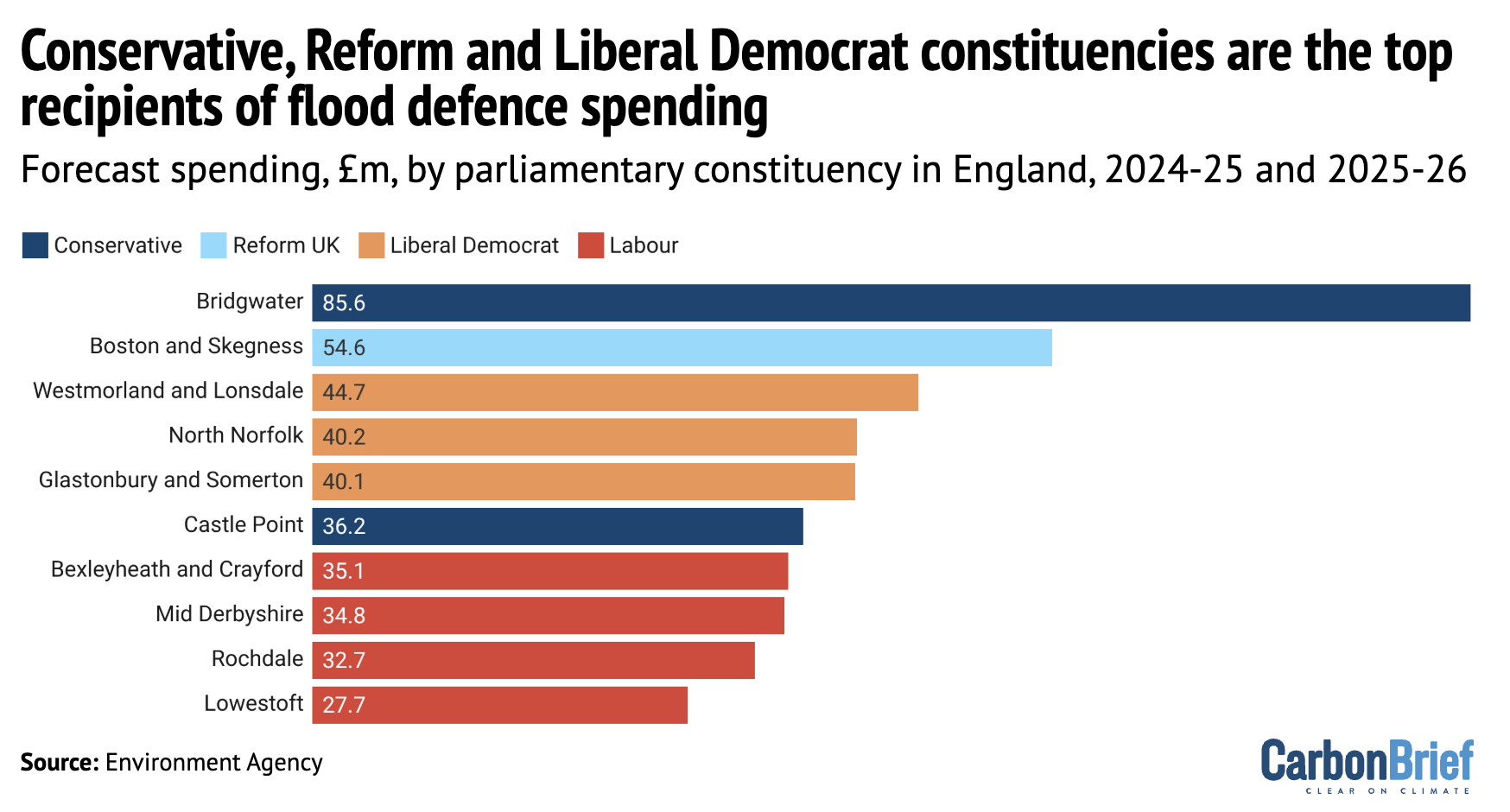
The constituency of Richard Tice MP, the climate-sceptic deputy leader of Reform UK, is the second-largest recipient of flood defence spending in England, according to new Carbon Brief analysis. Overall, the funding is disproportionately targeted at coastal and urban areas, many of which have Conservative or Liberal Democrat MPs.
Spotlight
Is there really a UK ‘greenlash’?
This week, after a historic Green Party byelection win, Carbon Brief looks at whether there really is a “greenlash” against climate policy in the UK.
Over the past year, the UK’s political consensus on climate change has been shattered.
Yet despite a sharp turn against climate action among right-wing politicians and right-leaning media outlets, UK public support for climate action remains strong.
Prof Federica Genovese, who studies climate politics at the University of Oxford, told Carbon Brief:
“The current ‘war’ on green policy is mostly driven by media and political elites, not by the public.”
Indeed, there is still a greater than two-to-one majority among the UK public in favour of the country’s legally binding target to reach net-zero emissions by 2050, as shown below.
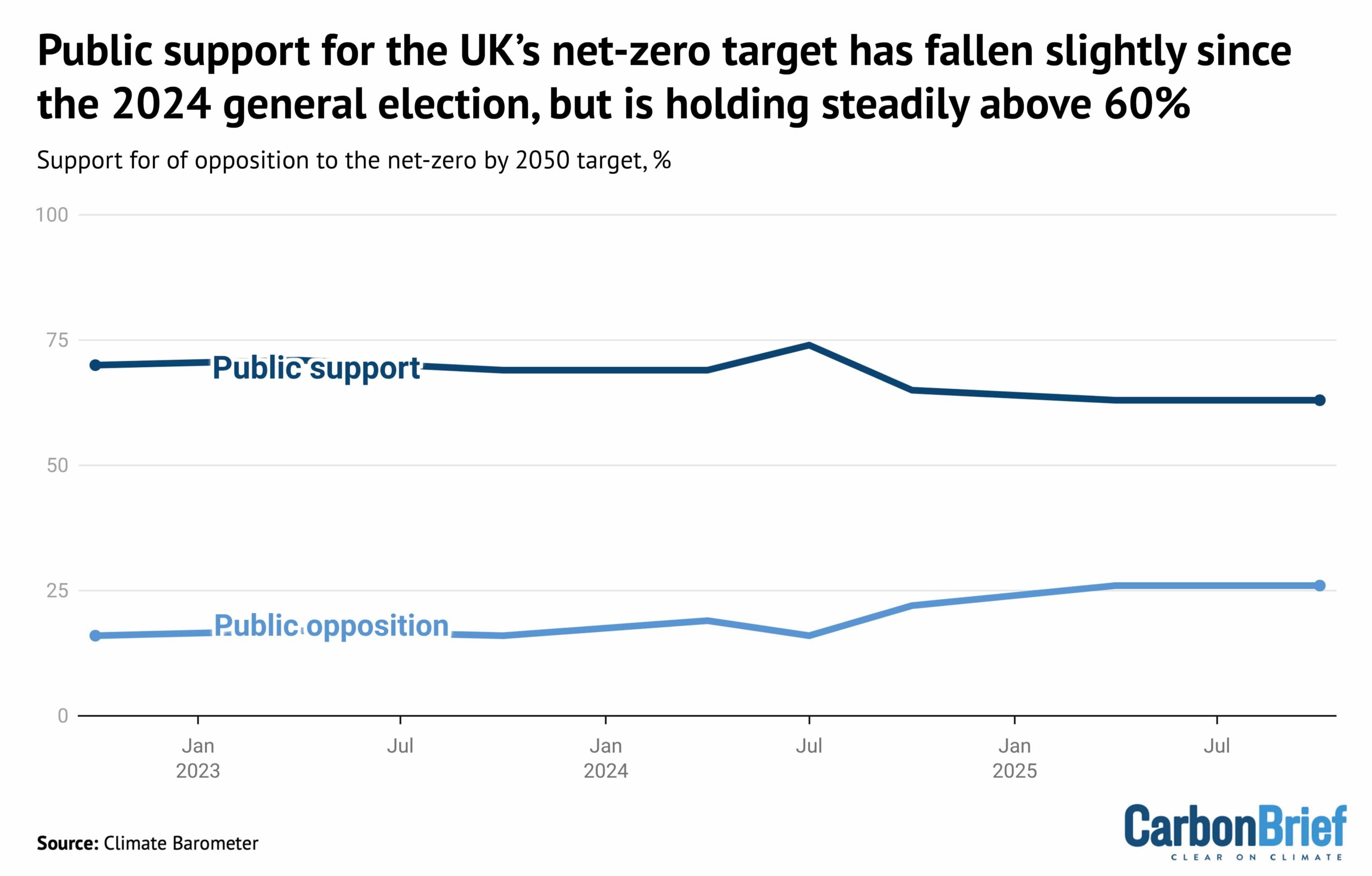
Steve Akehurst, director of public-opinion research initiative Persuasion UK, also noted the growing divide between the public and “elites”. He told Carbon Brief:
“The biggest movement is, without doubt, in media and elite opinion. There is a bit more polarisation and opposition [to climate action] among voters, but it’s typically no more than 20-25% and mostly confined within core Reform voters.”
Conservative gear shift
For decades, the UK had enjoyed strong, cross-party political support for climate action.
Lord Deben, the Conservative peer and former chair of the Climate Change Committee, told Carbon Brief that the UK’s landmark 2008 Climate Change Act had been born of this cross-party consensus, saying “all parties supported it”.
Since their landslide loss at the 2024 election, however, the Conservatives have turned against the UK’s target of net-zero emissions by 2050, which they legislated for in 2019.
Curiously, while opposition to net-zero has surged among Conservative MPs, there is majority support for the target among those that plan to vote for the party, as shown below.
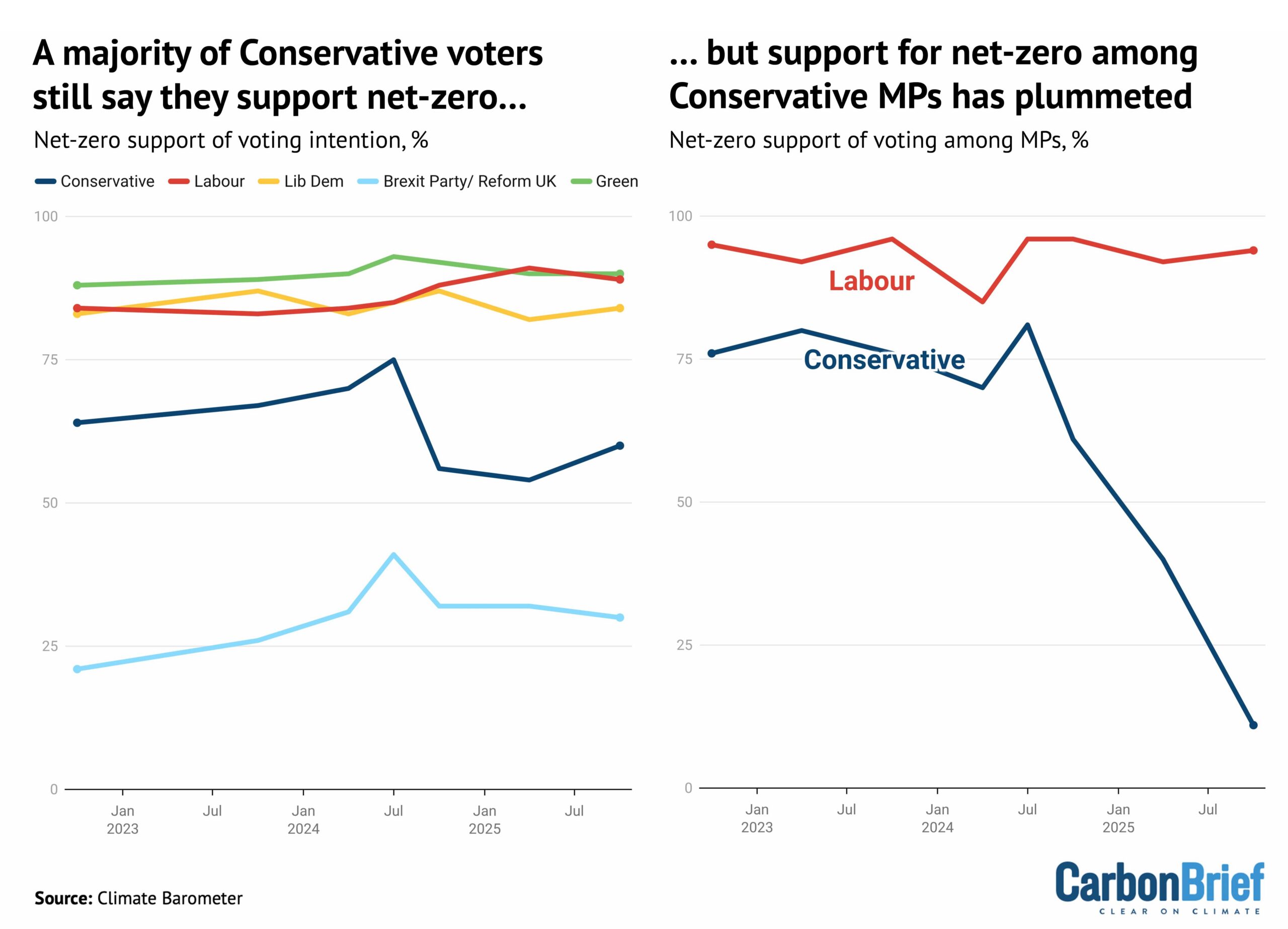
Dr Adam Corner, advisor to the Climate Barometer initiative that tracks public opinion on climate change, told Carbon Brief that those who currently plan to vote Reform are the only segment who “tend to be more opposed to net-zero goals”. He said:
“Despite the rise in hostile media coverage and the collapse of the political consensus, we find that public support for the net-zero by 2050 target is plateauing – not plummeting.”
Reform, which rejects the scientific evidence on global warming and campaigns against net-zero, has been leading the polls for a year. (However, it was comfortably beaten by the Greens in yesterday’s Gorton and Denton byelection.)
Corner acknowledged that “some of the anti-net zero noise…[is] showing up in our data”, adding:
“We see rising concerns about the near-term costs of policies and an uptick in people [falsely] attributing high energy bills to climate initiatives.”
But Akehurst said that, rather than a big fall in public support, there had been a drop in the “salience” of climate action:
“So many other issues [are] competing for their attention.”
UK newspapers published more editorials opposing climate action than supporting it for the first time on record in 2025, according to Carbon Brief analysis.
Global ‘greenlash’?
All of this sits against a challenging global backdrop, in which US president Donald Trump has been repeating climate-sceptic talking points and rolling back related policy.
At the same time, prominent figures have been calling for a change in climate strategy, sold variously as a “reset”, a “pivot”, as “realism”, or as “pragmatism”.
Genovese said that “far-right leaders have succeeded in the past 10 years in capturing net-zero as a poster child of things they are ‘fighting against’”.
She added that “much of this is fodder for conservative media and this whole ecosystem is essentially driving what we call the ‘greenlash’”.
Corner said the “disconnect” between elite views and the wider public “can create problems” – for example, “MPs consistently underestimate support for renewables”. He added:
“There is clearly a risk that the public starts to disengage too, if not enough positive voices are countering the negative ones.”
Watch, read, listen
TRUMP’S ‘PETROSTATE’: The US is becoming a “petrostate” that will be “sicker and poorer”, wrote Financial Times associate editor Rana Forohaar.
RHETORIC VS REALITY: Despite a “political mood [that] has darkened”, there is “more green stuff being installed than ever”, said New York Times columnist David Wallace-Wells.
CHINA’S ‘REVOLUTION’: The BBC’s Climate Question podcast reported from China on the “green energy revolution” taking place in the country.
Coming up
- 2-6 March: UN Food and Agriculture Organization regional conference for Latin America and Caribbean, Brasília
- 3 March: UK spring statement
- 4-11 March: China’s “two sessions”
- 5 March: Nepal elections
Pick of the jobs
- The Guardian, senior reporter, climate justice | Salary: $123,000-$135,000. Location: New York or Washington DC
- China-Global South Project, non-resident fellow, climate change | Salary: Up to $1,000 a month. Location: Remote
- University of East Anglia, PhD in mobilising community-based climate action through co-designed sports and wellbeing interventions | Salary: Stipend (unknown amount). Location: Norwich, UK
- TABLE and the University of São Paulo, Brazil, postdoctoral researcher in food system narratives | Salary: Unknown. Location: Pirassununga, Brazil
DeBriefed is edited by Daisy Dunne. Please send any tips or feedback to debriefed@carbonbrief.org.
This is an online version of Carbon Brief’s weekly DeBriefed email newsletter. Subscribe for free here.
The post DeBriefed 27 February 2026: Trump’s fossil-fuel talk | Modi-Lula rare-earth pact | Is there a UK ‘greenlash’? appeared first on Carbon Brief.
Greenhouse Gases
Analysis: Constituency of Reform’s climate-sceptic Richard Tice gets £55m flood funding
The Lincolnshire constituency held by Richard Tice, the climate-sceptic deputy leader of the hard-right Reform party, has been pledged at least £55m in government funding for flood defences since 2024.
This investment in Boston and Skegness is the second-largest sum for a single constituency from a £1.4bn flood-defence fund for England, Carbon Brief analysis shows.
Flooding is becoming more likely and more extreme in the UK due to climate change.
Yet, for years, governments have failed to spend enough on flood defences to protect people, properties and infrastructure.
The £1.4bn fund is part of the current Labour government’s wider pledge to invest a “record” £7.9bn over a decade on protecting hundreds of thousands of homes and businesses from flooding.
As MP for one of England’s most flood-prone regions, Tice has called for more investment in flood defences, stating that “we cannot afford to ‘surrender the fens’ to the sea”.
He is also one of Reform’s most vocal opponents of climate action and what he calls “net stupid zero”. He denies the scientific consensus on climate change and has claimed, falsely and without evidence, that scientists are “lying”.
Flood defences
Last year, the government said it would invest £2.65bn on flood and coastal erosion risk management (FCERM) schemes in England between April 2024 and March 2026.
This money was intended to protect 66,500 properties from flooding. It is part of a decade-long Labour government plan to spend more than £7.9bn on flood defences.
There has been a consistent shortfall in maintaining England’s flood defences, with the Environment Agency expecting to protect fewer properties by 2027 than it had initially planned.
The Climate Change Committee (CCC) has attributed this to rising costs, backlogs from previous governments and a lack of capacity. It also points to the strain from “more frequent and severe” weather events, such as storms in recent years that have been amplified by climate change.
However, the CCC also said last year that, if the 2024-26 spending programme is delivered, it would be “slightly closer to the track” of the Environment Agency targets out to 2027.
The government has released constituency-level data on which schemes in England it plans to fund, covering £1.4bn of the 2024-26 investment. The other half of the FCERM spending covers additional measures, from repairing existing defences to advising local authorities.
The map below shows the distribution of spending on FCERM schemes in England over the past two years, highlighting the constituency of Richard Tice.
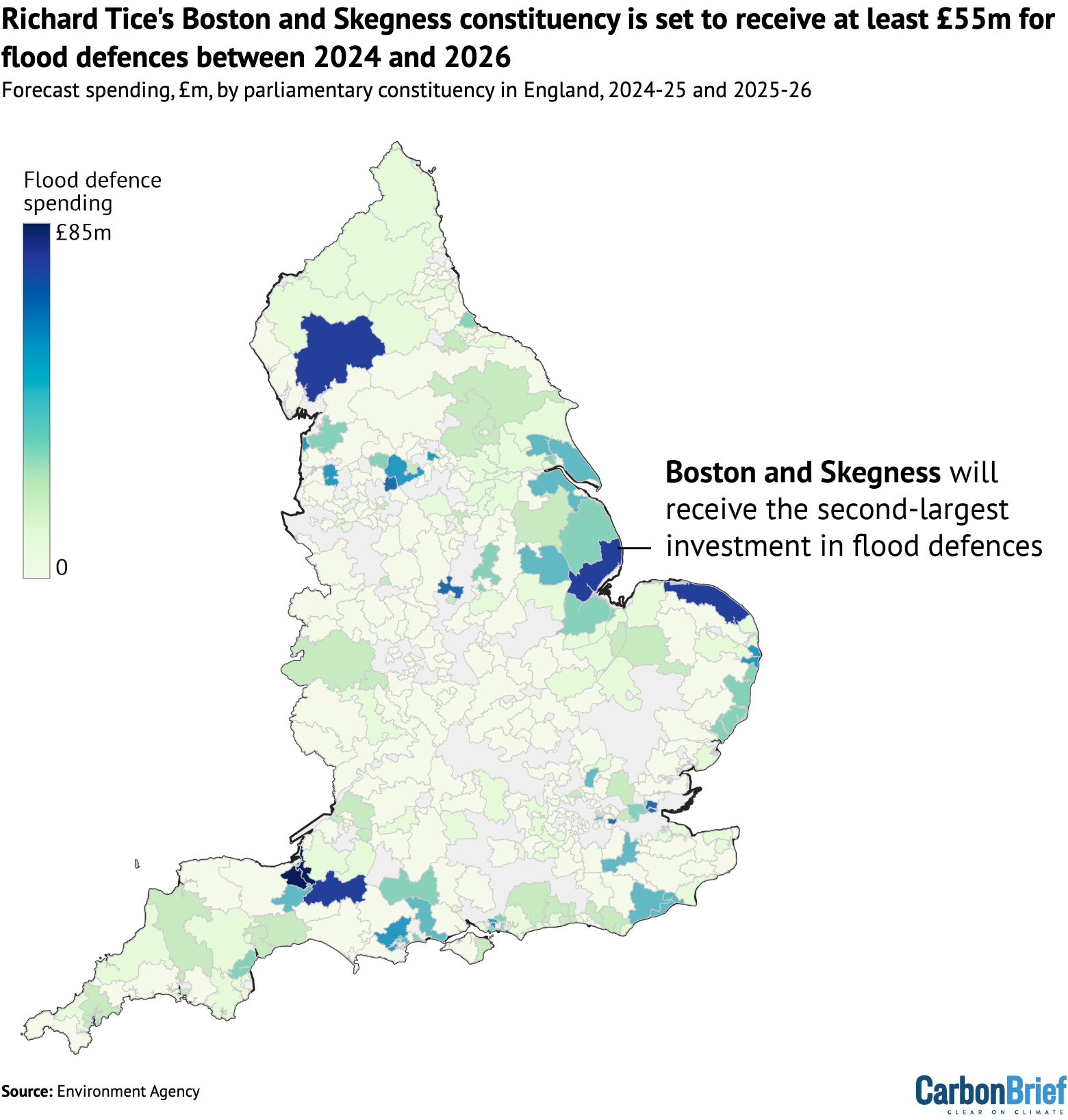
By far the largest sum of money – £85.6m in total – has been committed to a tidal barrier and various other defences in the Somerset constituency of Bridgwater, the seat of Conservative MP Ashley Fox.
Over the first months of 2026, the south-west region has faced significant flooding and Fox has called for more support from the government, citing “climate patterns shifting and rainfall intensifying”.
He has also backed his party’s position that “the 2050 net-zero target is impossible” and called for more fossil-fuel extraction in the North Sea.
Tice’s east-coast constituency of Boston and Skegness, which is highly vulnerable to flooding from both rivers and the sea, is set to receive £55m. Among the supported projects are beach defences from Saltfleet to Gibraltar Point and upgrades to pumping stations.
Overall, Boston and Skegness has the second-largest portion of flood-defence funding, as the chart below shows. Constituencies with Conservative and Liberal Democrat MPs occupied the other top positions.
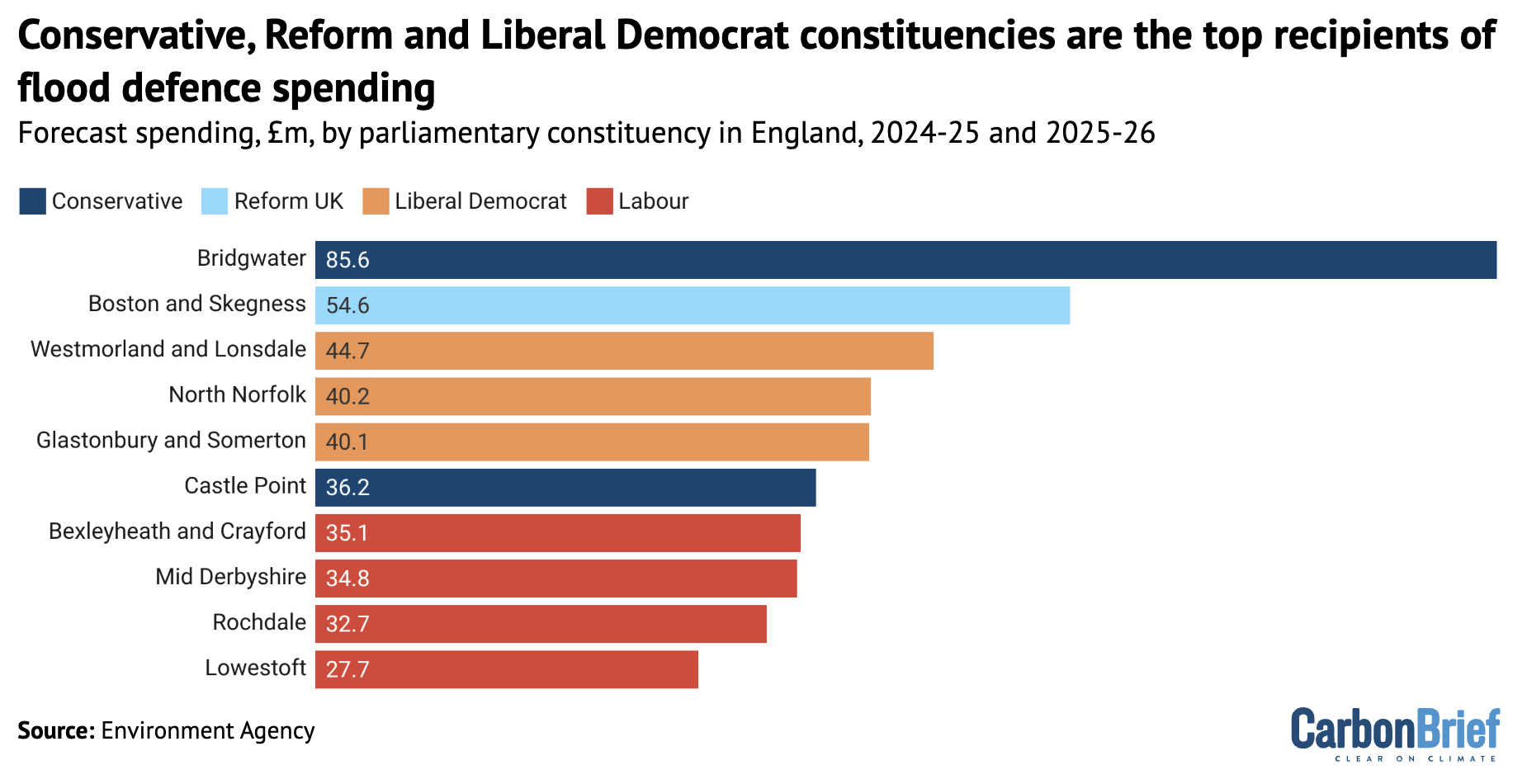
Overall, despite Labour MPs occupying 347 out of England’s 543 constituencies – nearly two-thirds of the total – more than half of the flood-defence funding was distributed to constituencies with non-Labour MPs. This reflects the flood risk in coastal and rural areas that are not traditional Labour strongholds.
Reform funding
While Reform has just eight MPs, representing 1% of the population, its constituencies have been assigned 4% of the flood-defence funding for England.
Nearly all of this money was for Tice’s constituency, although party leader Nigel Farage’s coastal Clacton seat in Kent received £2m.
Reform UK is committed to “scrapping net-zero” and its leadership has expressed firmly climate-sceptic views.
Much has been made of the disconnect between the party’s climate policies and the threat climate change poses to its voters. Various analyses have shown the flood risk in Reform-dominated areas, particularly Lincolnshire.
Tice has rejected climate science, advocated for fossil-fuel production and criticised Environment Agency flood-defence activities. Yet, he has also called for more investment in flood defences, stating that “we cannot afford to ‘surrender the fens’ to the sea”.
This may reflect Tice’s broader approach to climate change. In a 2024 interview with LBC, he said:
“Where you’ve got concerns about sea level defences and sea level rise, guess what? A bit of steel, a bit of cement, some aggregate…and you build some concrete sea level defences. That’s how you deal with rising sea levels.”
While climate adaptation is viewed as vital in a warming world, there are limits on how much societies can adapt and adaptation costs will continue to increase as emissions rise.
The post Analysis: Constituency of Reform’s climate-sceptic Richard Tice gets £55m flood funding appeared first on Carbon Brief.
Analysis: Constituency of Reform’s climate-sceptic Richard Tice gets £55m flood funding
Greenhouse Gases
Cropped 25 February 2026: Food inflation strikes | El Niño looms | Biodiversity talks stagnate
We handpick and explain the most important stories at the intersection of climate, land, food and nature over the past fortnight.
This is an online version of Carbon Brief’s fortnightly Cropped email newsletter.
Subscribe for free here.
Key developments
Food inflation on the rise
DELUGE STRIKES FOOD: Extreme rainfall and flooding across the Mediterranean and north Africa has “battered the winter growing regions that feed Europe…threatening food price rises”, reported the Financial Times. Western France has “endured more than 36 days of continuous rain”, while farmers’ associations in Spain’s Andalusia estimate that “20% of all production has been lost”, it added. Policy expert David Barmes told the paper that the “latest storms were part of a wider pattern of climate shocks feeding into food price inflation”.
-
Sign up to Carbon Brief’s free “Cropped” email newsletter. A fortnightly digest of food, land and nature news and views. Sent to your inbox every other Wednesday.
NO BEEF: The UK’s beef farmers, meanwhile, “face a double blow” from climate change as “relentless rain forces them to keep cows indoors”, while last summer’s drought hit hay supplies, said another Financial Times article. At the same time, indoor growers in south England described a 60% increase in electricity standing charges as a “ticking timebomb” that could “force them to raise their prices or stop production, which will further fuel food price inflation”, wrote the Guardian.
‘TINDERBOX’ AND TARIFFS: A study, covered by the Guardian, warned that major extreme weather and other “shocks” could “spark social unrest and even food riots in the UK”. Experts cited “chronic” vulnerabilities, including climate change, low incomes, poor farming policy and “fragile” supply chains that have made the UK’s food system a “tinderbox”. A New York Times explainer noted that while trade could once guard against food supply shocks, barriers such as tariffs and export controls – which are being “increasingly” used by politicians – “can shut off that safety valve”.
El Niño looms
NEW ENSO INDEX: Researchers have developed a new index for calculating El Niño, the large-scale climate pattern that influences global weather and causes “billions in damages by bringing floods to some regions and drought to others”, reported CNN. It added that climate change is making it more difficult for scientists to observe El Niño patterns by warming up the entire ocean. The outlet said that with the new metric, “scientists can now see it earlier and our long-range weather forecasts will be improved for it.”
WARMING WARNING: Meanwhile, the US Climate Prediction Center announced that there is a 60% chance of the current La Niña conditions shifting towards a neutral state over the next few months, with an El Niño likely to follow in late spring, according to Reuters. The Vibes, a Malaysian news outlet, quoted a climate scientist saying: “If the El Niño does materialise, it could possibly push 2026 or 2027 as the warmest year on record, replacing 2024.”
CROP IMPACTS: Reuters noted that neutral conditions lead to “more stable weather and potentially better crop yields”. However, the newswire added, an El Niño state would mean “worsening drought conditions and issues for the next growing season” to Australia. El Niño also “typically brings a poor south-west monsoon to India, including droughts”, reported the Hindu’s Business Line. A 2024 guest post for Carbon Brief explained that El Niño is linked to crop failure in south-eastern Africa and south-east Asia.
News and views
- DAM-AG-ES: Several South Korean farmers filed a lawsuit against the country’s state-owned utility company, “seek[ing] financial compensation for climate-related agricultural damages”, reported United Press International. Meanwhile, a national climate change assessment for the Philippines found that the country “lost up to $219bn in agricultural damages from typhoons, floods and droughts” over 2000-10, according to Eco-Business.
- SCORCHED GRASS: South Africa’s Western Cape province is experiencing “one of the worst droughts in living memory”, which is “scorching grass and killing livestock”, said Reuters. The newswire wrote: “In 2015, a drought almost dried up the taps in the city; farmers say this one has been even more brutal than a decade ago.”
- NOUVELLE VEG: New guidelines published under France’s national food, nutrition and climate strategy “urged” citizens to “limit” their meat consumption, reported Euronews. The delayed strategy comes a month after the US government “upended decades of recommendations by touting consumption of red meat and full-fat dairy”, it noted.
- COURTING DISASTER: India’s top green court accepted the findings of a committee that “found no flaws” in greenlighting the Great Nicobar project that “will lead to the felling of a million trees” and translocating corals, reported Mongabay. The court found “no good ground to interfere”, despite “threats to a globally unique biodiversity hotspot” and Indigenous tribes at risk of displacement by the project, wrote Frontline.
- FISH FALLING: A new study found that fish biomass is “falling by 7.2% from as little as 0.1C of warming per decade”, noted the Guardian. While experts also pointed to the role of overfishing in marine life loss, marine ecologist and study lead author Dr Shahar Chaikin told the outlet: “Our research proves exactly what that biological cost [of warming] looks like underwater.”
- TOO HOT FOR COFFEE: According to new analysis by Climate Central, countries where coffee beans are grown “are becoming too hot to cultivate them”, reported the Guardian. The world’s top five coffee-growing countries faced “57 additional days of coffee-harming heat” annually because of climate change, it added.
Spotlight
Nature talks inch forward
This week, Carbon Brief covers the latest round of negotiations under the UN Convention on Biological Diversity (CBD), which occurred in Rome over 16-19 February.
The penultimate set of biodiversity negotiations before October’s Conference of the Parties ended in Rome last week, leaving plenty of unfinished business.
The CBD’s subsidiary body on implementation (SBI) met in the Italian capital for four days to discuss a range of issues, including biodiversity finance and reviewing progress towards the nature targets agreed under the Kunming-Montreal Global Biodiversity Framework (GBF).
However, many of the major sticking points – particularly around finance – will have to wait until later this summer, leaving some observers worried about the capacity for delegates to get through a packed agenda at COP17.
The SBI, along with the subsidiary body on scientific, technical and technological advice (SBSTTA) will both meet in Nairobi, Kenya, later this summer for a final round of talks before COP17 kicks off in Yerevan, Armenia, on 19 October.
Money talks
Finance for nature has long been a sticking point at negotiations under the CBD.
Discussions on a new fund for biodiversity derailed biodiversity talks in Cali, Colombia, in autumn 2024, requiring resumed talks a few months later.
Despite this, finance was barely on the agenda at the SBI meetings in Rome. Delegates discussed three studies on the relationship between debt sustainability and implementation of nature plans, but the more substantive talks are set to take place at the next SBI meeting in Nairobi.
Several parties “highlighted concerns with the imbalance of work” on finance between these SBI talks and the next ones, reported Earth Negotiations Bulletin (ENB).
Lim Li Ching, senior researcher at Third World Network, noted that tensions around finance permeated every aspect of the talks. She told Carbon Brief:
“If you’re talking about the gender plan of action – if there’s little or no financial resources provided to actually put it into practice and implement it, then it’s [just] paper, right? Same with the reporting requirements and obligations.”
Monitoring and reporting
Closely linked to the issue of finance is the obligations of parties to report on their progress towards the goals and targets of the GBF.
Parties do so through the submission of national reports.
Several parties at the talks pointed to a lack of timely funding for driving delays in their reporting, according to ENB.
A note released by the CBD Secretariat in December said that no parties had submitted their national reports yet; by the time of the SBI meetings, only the EU had. It further noted that just 58 parties had submitted their national biodiversity plans, which were initially meant to be published by COP16, in October 2024.
Linda Krueger, director of biodiversity and infrastructure policy at the environmental not-for-profit Nature Conservancy, told Carbon Brief that despite the sparse submissions, parties are “very focused on the national report preparation”. She added:
“Everybody wants to be able to show that we’re on the path and that there still is a pathway to getting to 2030 that’s positive and largely in the right direction.”
Watch, read, listen
NET LOSS: Nigeria’s marine life is being “threatened” by “ghost gear” – nets and other fishing equipment discarded in the ocean – said Dialogue Earth.
COMEBACK CAUSALITY: A Vox long-read looked at whether Costa Rica’s “payments for ecosystem services” programme helped the country turn a corner on deforestation.
HOMEGROWN GOALS: A Straits Times podcast discussed whether import-dependent Singapore can afford to shelve its goal to produce 30% of its food locally by 2030.
‘RUSTING’ RIVERS: The Financial Times took a closer look at a “strange new force blighting the [Arctic] landscape”: rivers turning rust-orange due to global warming.
New science
- Lakes in the Congo Basin’s peatlands are releasing carbon that is thousands of years old | Nature Geoscience
- Natural non-forest ecosystems – such as grasslands and marshlands – were converted for agriculture at four times the rate of land with tree cover between 2005 and 2020 | Proceedings of the National Academy of Sciences
- Around one-quarter of global tree-cover loss over 2001-22 was driven by cropland expansion, pastures and forest plantations for commodity production | Nature Food
In the diary
- 2-6 March: UN Food and Agriculture Organization regional conference for Latin America and Caribbean | Brasília
- 5 March: Nepal general elections
- 9-20 March: First part of the thirty-first session of the International Seabed Authority (ISA) | Kingston, Jamaica
Cropped is researched and written by Dr Giuliana Viglione, Aruna Chandrasekhar, Daisy Dunne, Orla Dwyer and Yanine Quiroz.
Please send tips and feedback to cropped@carbonbrief.org
The post Cropped 25 February 2026: Food inflation strikes | El Niño looms | Biodiversity talks stagnate appeared first on Carbon Brief.
Cropped 25 February 2026: Food inflation strikes | El Niño looms | Biodiversity talks stagnate
-
Greenhouse Gases7 months ago
Guest post: Why China is still building new coal – and when it might stop
-
Climate Change7 months ago
Guest post: Why China is still building new coal – and when it might stop
-

 Greenhouse Gases2 years ago
Greenhouse Gases2 years ago嘉宾来稿:满足中国增长的用电需求 光伏加储能“比新建煤电更实惠”
-
Climate Change2 years ago
Bill Discounting Climate Change in Florida’s Energy Policy Awaits DeSantis’ Approval
-
Climate Change2 years ago
Spanish-language misinformation on renewable energy spreads online, report shows
-

 Climate Change2 years ago
Climate Change2 years ago嘉宾来稿:满足中国增长的用电需求 光伏加储能“比新建煤电更实惠”
-
Climate Change Videos2 years ago
The toxic gas flares fuelling Nigeria’s climate change – BBC News
-

 Carbon Footprint2 years ago
Carbon Footprint2 years agoUS SEC’s Climate Disclosure Rules Spur Renewed Interest in Carbon Credits




